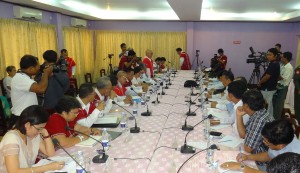A Karen community based organization has expressed concerns about a lack of transparency in the peace building process underway in Burma – which has been labeled as ‘The Norway Peace Initiative Process.’
 Saw Paul Sein Twa director of the grassroots community-based organization, The Karen Environmental and Social Action Network (KESAN), told Karen News that he fears that, rather than solve the myriad challenges facing Burma, The Norway Peace Initiative Process lacks legitimacy and may even fuel further tensions in the conflict-ridden country.
Saw Paul Sein Twa director of the grassroots community-based organization, The Karen Environmental and Social Action Network (KESAN), told Karen News that he fears that, rather than solve the myriad challenges facing Burma, The Norway Peace Initiative Process lacks legitimacy and may even fuel further tensions in the conflict-ridden country.
“There is no transparency, they don’t disclose information, their agreements with the government or with the ceasefire groups or their ‘peace building process’ to the public.”
Saw Paul says ethnic Karen CBO’s, such as KESAN, are failing to see how this top down approach will benefit the poor and powerless in Burma.
“They approach only the government and the party involved in the conflict. It is a lack of parallel discussion and participation…they exclude the involvement of civil society – their aid money and program is top down, and goes to the military-linked elite.”
Groups that represent the interests of ethnic minorities in Burma, such as KESAN, are also worried about a lack of consultation with persecuted ethnic minorities under The Norway Peace Initiative.
“Until now we didn’t get their official peace initiative plan, we only got it from a leaked document,” said Saw Paul.
Sources close to the Karen National Union (KNU) also said members of the Norwegian led peace process had only approached a few KNU leaders about their peace process.
Saw Htoo Klee from The Karen Office of Relief and Development (KORD) told Karen News.
“They (KNU leaders) told us that the issue is political so they cannot carry out consultation with related community groups.”
KORD is involved with the resettlement of Karen internally displaced people, who have fled their communities due to conflict in Eastern Burma.
Saw Htoo Klee said his organization does not know the whole process of the internally displaced people resettlement program put in place by the Norwegians.
“From my opinion I think the process should not go like this. The related groups need to know the process, all related sectors need to be included.”
Saw Paul is worried that the humanitarian program is motivated more by politics than by true intentions of reform by the military-backed government in Burma.
“As lack of transparency we are afraid to trust this peace process, their humanitarian program could be used as political tools” by Burma’s government.
Saw Paul is also concerned that taking lessons from The Norway Peace Initiative process in Sri Lanka and using it in Burma creates great risks.
“In Sri Lanka they used humanitarian aid to support the peace process but because of a lack of transparency, their program became politicized. When the government carried out programs in the Tamil Tiger areas, the Tamil leaders became suspicious that the government was using aid to extend their power…both sides lost trust and the conflict restarted again.”
Saw Paul said one of the major issues facing future stability in Burma’s ethnically diverse population, is a fundamental lack of trust between the government and minorities.
“In Sri Lanka lesson they start development programs after the ceasefire without solving the core political issue. It is not lead to peace but incited further war.”
“We need the peace building process to have transparency, with formal consultation, community based organisations, KNU leaders and other ethnic groups to reach a common decision for the peace building process. It is important for the local sectors to design their own peace process and then be supported.
“Our community based organisations agree that the political process has to go forward, but humanitarian intervention should not become a block to the political process,” Saw Paul concluded.



